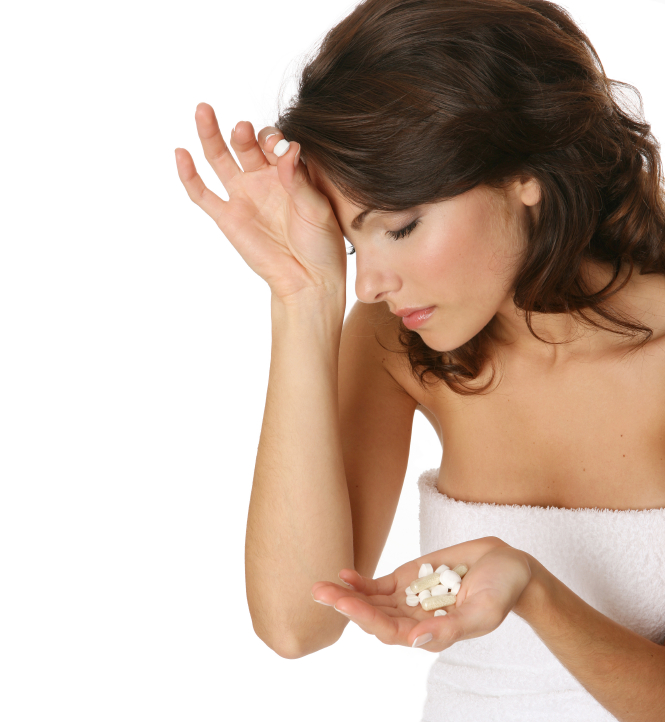We’ve become an over-worked, sleep-deprived nation focused on doing more with less.
The result? About 30% to 80% of the U.S. population suffers from tension headaches…every single day.1
Most people don’t even tell their doctors. They assume it is just a normal part of life or that there’s nothing they can do. Rest assured, it’s not normal. And there are treatments that help. Just not the ones most people turn to…
Consider NSAIDs like Advil. Not surprisingly, these OTC pills do nothing to resolve the root cause of headaches. And they come with a host of side-effects and safety concerns—like stomach bleeding and kidney damage.
To treat headaches and stop them from coming back, you need to resolve the underlying problem.
Now, research proves that a powerful natural remedy stops headaches by increasing serotonin levels.
If you’ve heard of 5-HTP before, then you may already know how amazing it is. It’s widely used as a sleep aid, to improve weight loss, and as a depression fighter. And studies now show it destroys headaches.
Researchers in Portugal looked at 65 people who suffered from chronic tension headaches. Subjects were given 300 mg of 5-HTP or a placebo for eight weeks.
At the end of the study they found that the 5-HTP group had dramatically cut their use of painkillers. But here’s where it gets interesting…
Two weeks after the study ended, researchers decided to do a follow-up. And it turns out that the people in the 5-HTP group reported having far less headaches after the study. That means for two weeks after they stopped taking the 5-HTP it just kept on working to prevent headaches.2
Another study looked at 48 school children with headaches and sleep disturbances. This time, the kids who took the 5-HTP had a 70% reduction in headaches.3 Pretty impressive.
Your body makes some 5-HTP naturally. It is vital to the production of serotonin— the “happy hormone.” Serotonin creates feelings of overall well-being.
It also stimulates endorphins—our body’s natural pain killers. So 5-HTP sets in motion a positive domino-effect inside of your body. This domino-effect ends with you having more serotonin and more endorphins to wipe out pain and make you feel more relaxed.
Problem is, many people don’t have enough 5-HTP or serotonin. Serotonin levels take a cliff-dive as we age. Add some stress, poor sleep, bad diet, and your levels just keep dropping.
To boost those 5-HTP (and serotonin…and pain-killing endorphin) levels you’ll need to get it through your diet.
Your body converts 5-HTP from tryptophan—which is found in small amounts in many common foods like walnuts, eggplant, plums, and tomatoes. You should try to add more of these to your diet each week. The acronym—W.E.P.T.—can help you remember what to buy the next time you’re at the grocery store.
But in order to get the levels you need, you’ll definitely have to take a supplement. 5-HTP supplements are made from the seeds of an African plant called Griffonia simplicifolia. It’s widely available, but don’t skimp—buy a high quality brand with good reviews.
Because 5-HTP can cause some stomach upset, always take it 20-30 minutes before meals. Also, you’ll want to start small and build up to your ideal dose.
Begin by taking 50 mg, three times daily. See how you feel. If you feel you need more add another 50 mg daily. 300 mg daily should help keep headaches at bay. If you want to take more than that, it is a good idea to talk it over with a doctor.
Also, while 5-HTP will help with headaches, it is important to work on controlling your stress and anxiety. If you’re tired, go to bed early. Try to take at least a short walk each day. Drink plenty of water—dehydration can spark a headache in no time. If you’re overextended, cut back on some stuff.
But until you get those tensions under control, grab the 5-HTP to prevent headaches and feel your best.
Like this Article? Forward this article here or Share on Facebook.
References:
1 http://www.webmd.com/migraines-headaches/guide/tension-headaches
2 http://www.ncbi.nlm.nih.gov/pubmed/?term=5+htp+and+chronic+tension+headaches
3 http://www.ncbi.nlm.nih.gov/pubmed/?term=3308389

